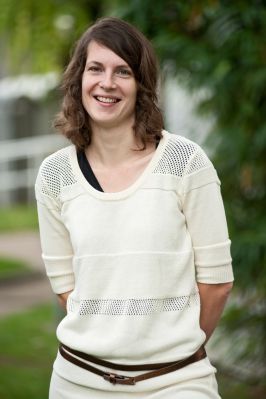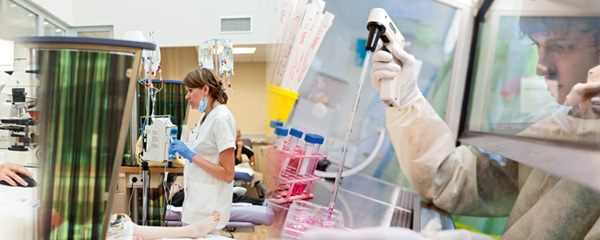You are here
The teams
Séverine Tabone-Eglinger, Leader of IMODI project
The Tumor Model Laboratory (LMT)

Dr Séverine Tabone-Eglinger is head of the Innovative MODels Initiative (IMODI) project for the Synergie Lyon Cancer Foundation and the Centre Léon Bérard. The aim of IMODI is to develop tumour models, which will help to identify novel anti-cancer therapies.
Led by Oncodesign, Innovative MODels Initiative (IMODI) is a national project encompassing academic (national research institutes, universities and hospitals) and private (pharmaceutical laboratories and small and medium-sized biotechnological companies) collaborators. The common objective: to develop pre-clinical models, which will enable a more efficient testing of molecules and, in the long term, provide novel therapeutic treatments for cancer patients. Séverine Tabone-Eglinger coordinates the implementation and the monitoring of the project at the Centre Léon Bérard (CLB) and at the Synergie Lyon Cancer Foundation, and will liaise with the IMODI project collaborators on the French territory. The Tumour Model Laboratory (“Laboratoire des Modèles Tumoraux” or LMT) of the Synergie Lyon Cancer Foundation, plays a central role in this project by developing mouse cancer models through tumour transplants, a procedure which best mimics the human disease. The CLB will also be significantly involved in the project, by providing different medical and technical services including recruiting patients, sampling tumour specimens and conducting the molecular characterisation of the samples. And finally, the bioinformatics platform, based at the CLB and supported by the Synergie Lyon Cancer Foundation, will be in charge of analysing the data obtained.
Following a research training at the French National Institute for Health and Medical Research (“Institut National de la Santé et de la Recherche Médicale” or INSERM), Séverine Tabone-Eglinger obtained a Diploma of Advanced Studies (“Diplôme d’Etude Approfondies” or DEA) in toxicology in Paris, in 2003, in order to “make a connection between biology and pharmacy”, she adds. After having completed her PhD in pharmacy, she did a PhD in oncology at the Claude Bernard University in Lyon (“Université Claude Bernard de Lyon” or UCBL1). For the period of her studies, she primarily investigated the formation of a particular and rare type of malignant tumour of the digestive tract: “Since this tumour is caused by a specific genetic modification, in this case a mutation in the ‘KIT’ gene, it constitutes an interesting model for the research on target therapies”.
Coordinating an innovative project for patients: “a meaningful mission"
Up until 2013, Séverine Tabone-Eglinger conducted a post-doc for the “Cellular Physiology and Metabolism” department of the University Medical Centre of Geneva, Switzerland, in a laboratory carrying out fundamental research on the KIT gene: “I was, therefore, able to develop my skills further and increase my knowledge. There, I studied the role of the protein derived from the KIT gene and that of its ligand, in other words the molecule to which it binds like a key in a keyhole, in the control of adult stem cells, but also in the development of tumours when the immune system is deregulated”, the young scientist explains. Today, with the IMODI project, Séverine Tabone-Eglinger is making a leap forward in the process, from fundamental research to pre-clinical management. “This project is in adequacy with my skills, but it also enables me to investigate novel aspects of research, more dynamic, organisational and interpersonal relationships. I am also glad to come back to a more translational research, one which is closer to patients”.

